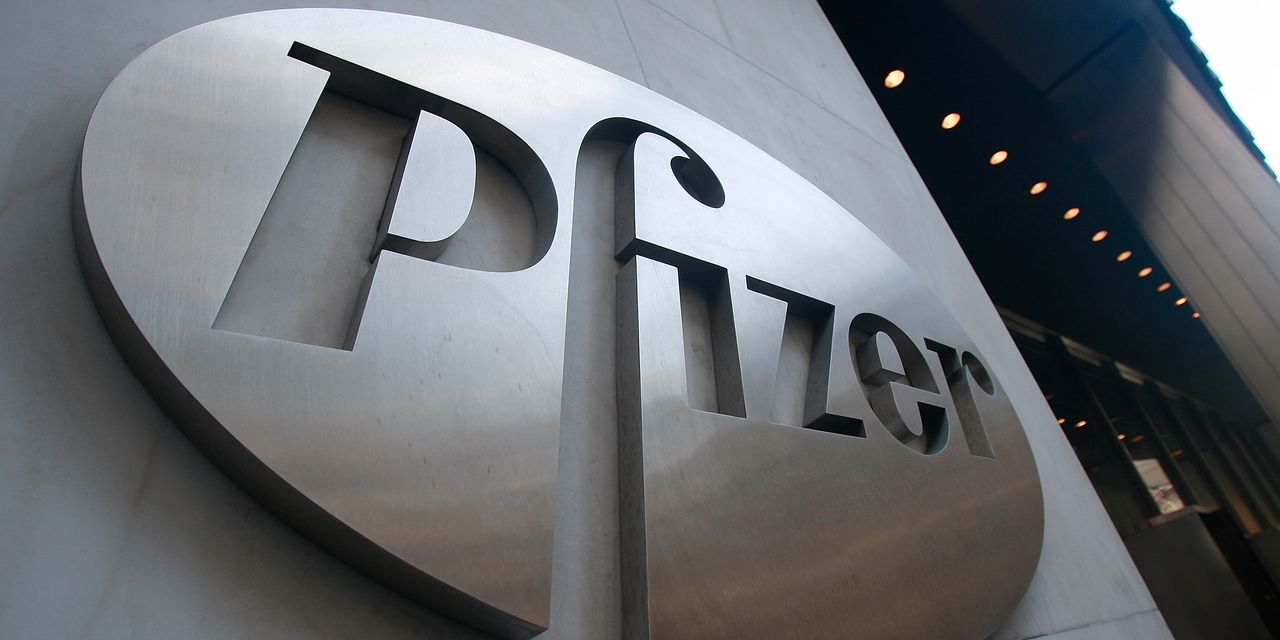Pfizer delivered a solid set of first-quarter results on Tuesday morning. Earnings were just short of the consensus estimate, while revenue was well ahead of expectations.
Driving the beat were revenue from Pfizer’s (ticker: PFE) Covid-19 vaccine and its antiviral, which came in significantly higher than analysts had predicted. Pfizer maintained its full-year outlook for Covid-19 vaccine sales, despite speculation that those estimates might come down.
The company on Tuesday signaled an important change in strategy: More cash to investors, less spending on mergers and acquisitions.
In prepared remarks distributed ahead of an investor call scheduled for 10 a.m. on Tuesday, Pfizer executives said that the M&A spree that resulted, most recently, in a $43 billion deal to acquire the biotech
Seagen
(SGEN), is winding down.
“Since 2022, we’ve invested approximately $70 billion, including Seagen, in business development,” said Pfizer Chief Financial Officer David Denton. “As we begin to de-lever our capital structure after the closing of the Seagen transaction, we expect to return to a more balanced capital allocation mix,” Denton said, saying that the company would increase focus on raising dividends and repurchasing shares.
Pfizer
stock jumped 1% in premarket trading on Tuesday. The company reported earnings per share of 97 cents in the first three months of 2023, just shy of analysts’ expectations for 98 cents, according to FactSet. Revenue of $18.3 billion was well ahead of expectations for $16.6 billion.
Pfizer also reaffirmed its full-year guidance of earnings per share from $3.25 to $3.45, on revenue of $67 billion to $71 billion.
While overall revenue were down 26% on an operational basis from the same quarter last year, Pfizer noted that revenue were up 5% operationally excluding its Covid-19 products, the vaccine Comirnaty and the antiviral Paxlovid.
“Our first-quarter results were in line with our expectations, underlining our continued confidence in achieving 7% to 9% operational revenue growth for fiscal-year 2023, excluding our Covid-19 products and anticipated foreign exchange impacts,” Denton in a statement.
Paxlovid sales for the quarter were $4.1 billion, well above the consensus estimate for $2.9 billion, while Comirnaty revenue was $3.1 billion, better than the $2.7 billion estimates. Purchases of both products are shifting this year in the U.S. from the pandemic-era norm, when the federal government bought and distributed both for free, to a postpandemic status quo, where both drugs will be sold on the commercial markets.
Despite the beat, Pfizer said that its expectations for the company’s Covid-19 franchise remain unchanged. Pfizer is expecting a drop in Covid-19 vaccine utilization this year, and for governments to work through excess Paxlovid inventory this year.
“We continue to expect 2023 to be a transition year as the virus continues to mutate and we move from advance purchases under government contracts to more traditional supply arrangements in a commercial model for both Comirnaty and Paxlovid in the U.S.,” Pfizer CEO Albert Bourla said in his prepared remarks.
In slides released ahead of the investor call, Pfizer debuted results from an early-stage study of its second-generation Covid-19 antiviral pill, which it says would not need to be taken in combination with ritonavir, a drug used as part of the Paxlovid regimen that interacts with a number of other medications. Pfizer said that the study shows that the drug, called PF-07817883, is well tolerated, and that it is expected to be similarly effective as Paxlovid without needing ritonavir.
The company’s chief scientific officer, Mikael Dolsten, said that Pfizer plans to begin a Phase 2 study in the first half of this year.
Revenue from Nurtec ODT, the migraine drug Pfizer acquired in its deal to buy Biohaven Pharmaceuticals which closed late last year, were $167 million.
On Sunday, the Financial Times reported that Pfizer and its partner
BioNTech
(BNTX) are negotiating a deal to provide 70 million Covid-19 vaccine doses a year to the European Union through 2026. Under the terms of the agreement, EU members would pay only half price for unused doses, according to the FT.
That’s bad news for
Moderna
(MRNA), which would be locked out of the EU market, but Jefferies analyst Akash Tewari also argued in a note on Sunday that the story suggests far lower Covid-19 vaccine sales this year than Pfizer has said it expects.
Those predictions did not materialize in Tuesday’s release, though analysts will likely ask about them during the morning’s investor call.
Of the FT report, Pfizer said: “The discussions have been conducted in good faith by all parties and remain confidential.”
Pfizer stock is down 24.1% so far this year, and down 19.6% over the past 12 months, as of the close of trading on Friday. The stock trades at 11 times earnings expected over the next 12 months, according to FactSet, one of the lowest price-to-earnings multiples of its peer group.
In addition to questions about the future of its Covid-19 franchise, Pfizer also faces concerns about a number of patent expirations of important products coming before the end of the decade, which the company has said could lead to $17 billion in lost annual revenue.
Pfizer says it expects to have $20 billion revenue from new-product launches by 2030, and $25 billion from new business-development deals.
Write to Josh Nathan-Kazis at [email protected] and Jack Denton at [email protected]
Read the full article here


